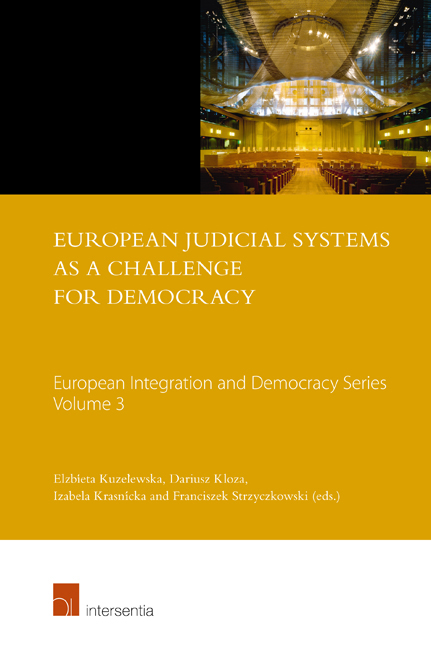Book contents
- Frontmatter
- Foreword
- Preface
- Contents
- List of Abbreviations
- PART ONE THE COURT OF JUSTICE OF THE EUROPEAN UNION
- PART TWO THE EUROPEAN COURT OF HUMAN RIGHTS
- 11 Protocol 16 to the ECHR: A Convenient Tool for Judicial Dialogue and Better Domestic Implementation of the Convention?
- 12 The EU's Parliamentary Representation in the Light of the Strasbourg Court's Sejdić and Zornić Standards: Is there Tendency for a New Parliamentary Order in the EU?
13 - The European Concept of a Fair Trial and the Legal Admissibility of Assessors in the Polish Judicial System
from PART TWO - THE EUROPEAN COURT OF HUMAN RIGHTS
Published online by Cambridge University Press: 15 December 2017
- Frontmatter
- Foreword
- Preface
- Contents
- List of Abbreviations
- PART ONE THE COURT OF JUSTICE OF THE EUROPEAN UNION
- PART TWO THE EUROPEAN COURT OF HUMAN RIGHTS
- 11 Protocol 16 to the ECHR: A Convenient Tool for Judicial Dialogue and Better Domestic Implementation of the Convention?
- 12 The EU's Parliamentary Representation in the Light of the Strasbourg Court's Sejdić and Zornić Standards: Is there Tendency for a New Parliamentary Order in the EU?
Summary
INTRODUCTION
Across several European legal systems we can see an ongoing struggle to develop both efficient and legitimate way to promote and evaluate new judges. This legal procedure is to ensure that the staff needs of the judiciary system are satisfied, but at the same time it seeks the opportunity to select those of the candidates for a full nominated judge who – during acting as a temporary judge – failed to prove their practical adjudicating skills. In order to carry out this task, different systems established different institutions, i.e. a temporary judge, a lay judge, an assistant judge or an assessor.
Each of them differs slightly from the other, but all of them were argued not to meet the standards of a fair trial put forward by the European Convention on Human Rights.
THE POSITION OF AN ASSESSOR IN POLISH COMMON COURTS
With the idea of reintroducing the position of a temporary judge in the Polish judicial system comes the question of the constitutionality of this legal construct and its compliance with the European concept of a fair trial laid down in the European Convention on Human Rights, especially its Article 6.
Knowing that a temporary judge position – as proposed – is in fact a fixed resurrection of a previous office – the general court assessor, one has to keep in mind the prohibitions put forward both by the European and the domestic judicial institutions.
The institution of the assessor (assistant judge) in general courts has been revoked from the Polish legal system on the basis of the Polish Constitutional Tribunal judgment of 24 October 2007, as it was found not to be in compliance with the standards of a fair trial upheld by the Polish Constitution.
Assessors were candidates for the office of district court judge who, under the 2001 Law on the Organisation of Common Courts, had to work for a minimum of three years as an assessor in a district court on completion of their training and examinations.
The decision of the Constitutional Tribunal removed the assessors from general courts, leaving the same office in administrative courts. Although the legal practice in administrative courts has also changed, the legal position of an assessor in these special courts is more independent then the one the assessors in general courts have ever had.
- Type
- Chapter
- Information
- European Judicial Systems as a Challenge for Democracy , pp. 233 - 244Publisher: IntersentiaPrint publication year: 2015

